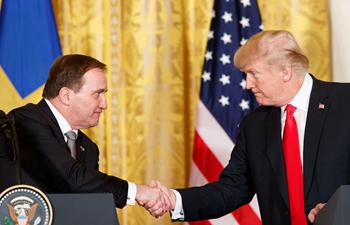CHICAGO, March 10 (Xinhua) -- Imposing tariffs may help U.S. steel workers, "but the potential damage to the overall economy might be greater than the benefit to the steel industry," a trade official in the U.S. state of Iowa has said.
"Iowa soybean farmers are very concerned about the potential impact" of imposing heavy tariffs on imported steel and aluminum, Kirk Leeds, CEO of Iowa Soybean Association (ISA) that serves more than 11,000 members across the agricultural state, told Xinhua.
Despite mounting dissensions amid trading partners around the world, U.S. President Donald Trump on Thursday signed proclamations to impose a 25-percent tariff on imported steel and a 10-percent tariff on aluminum.
In an open letter to Trump on Wednesday, all six congressional lawmakers from Iowa warned that the tariffs "could set into motion a chain of retaliatory measures, hurting Iowans from the family farm to the family-owned manufacturing plant."
"As farmers have already faced several years of low commodity prices, any hit to demand would be devastating to their financial situations," the letter said.
Marina Whitman, professor emerita of business administration and public policy at the University of Michigan, echoed Leeds' word.
Trump's tariffs "are likely to raise prices of consumer goods containing aluminum or steel and, more important, will raise them for manufacturers whose products use aluminum and steel, making them less competitive."
"A lot more people are employed in the U.S. in companies using aluminum and/or steel in their products than in those making them," she said. Moreover, "it is a major step toward undermining the international rule of law in trade, which the U.S. took the lead in creating ever since WWII."
The American Soybean Association also responded forcefully to the tariffs. "These tariffs are a disastrous course of action from the White House. They may lead to retaliation by one or more of our valuable trading partners, which in turn will kneecap demand for soybeans in a time when the farm economy is struggling," it said in a statement.
Agricultural trade has been the ballast in the ships sailing in the sea of trade between the United States and China.
"The only way to maintain good trade relations between China and the U.S. is to make sure that both sides continue to fully engage in conversation, negotiations and open dialogue," said Leeds, which will soon pay a visit to China.
"Over the years, the ISA has developed very deep and meaningful relationship with many friends in China," he said. "We will continue to reach out to these friends as we navigate these unsettled times."
"China is an important customer of the Iowa soybean farmers and we look forward to working with our friends to overcome what we hope are short-term challenges," Leeds said.
"We need to make sure that these current waves of discontent in trade between our two important countries do not disrupt agricultural trade," Leeds added.













